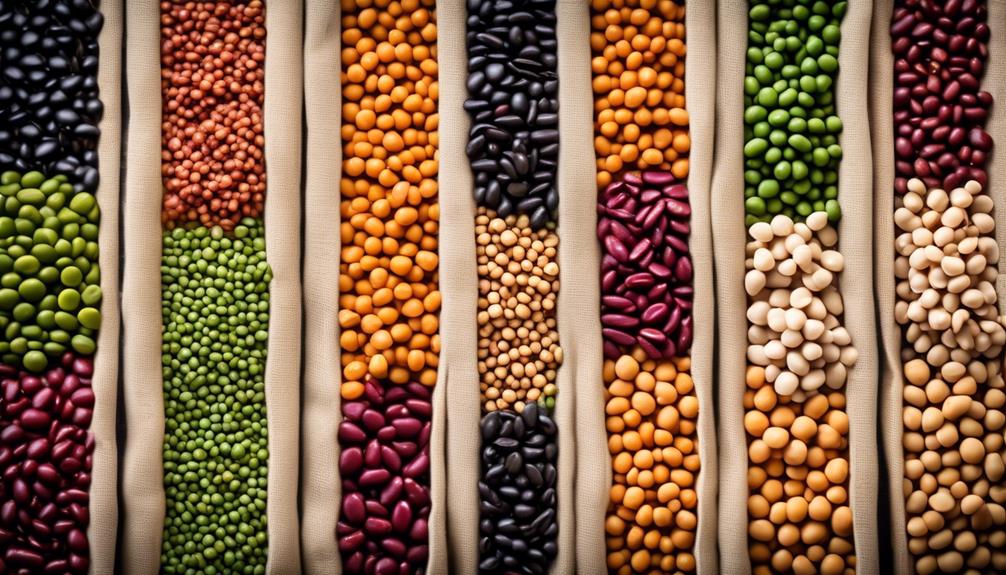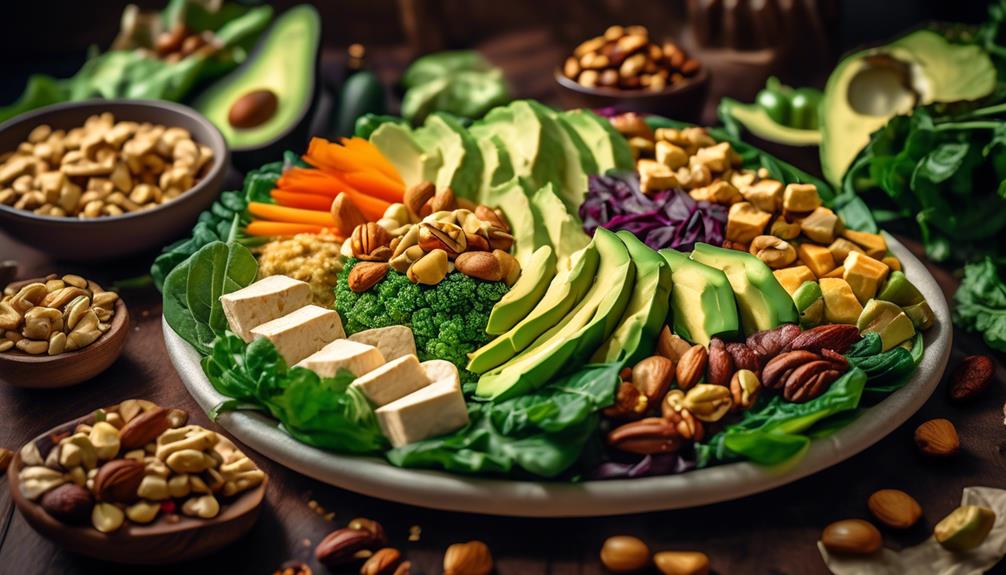Are you following a plant-based keto diet and looking for low carb vegetarian protein sources to meet your nutritional needs? Well, look no further! In this discussion, we will explore some top options that will keep you on track with your goals.
From versatile tofu and tempeh to protein-packed lentils and legumes, we've got you covered.
But that's not all – we will also uncover the power of nuts and seeds and the convenience of plant-based protein powders.
So, if you're curious to discover the best low carb vegetarian protein sources for your plant-based keto journey, you're in for a treat.
Tofu and Tempeh

Tofu and tempeh are versatile plant-based protein sources that can be incorporated into a ketogenic diet. Tofu, also known as bean curd, is made from soybeans and is an excellent source of protein for vegetarians and vegans. It's low in carbohydrates and high in beneficial nutrients such as iron, calcium, and magnesium. Tofu can be used in a variety of dishes, making it a popular choice for those following a ketogenic diet.
There are numerous tofu recipes that can be enjoyed on a plant-based keto diet. For example, you can use tofu as a substitute for meat in stir-fries, soups, and salads. You can also marinate and grill tofu to add a delicious and protein-rich component to your meals. Tofu can be scrambled and used as a replacement for eggs in breakfast dishes like tofu scramble. Additionally, you can blend tofu with spices and herbs to create a creamy and nutritious salad dressing.
Tempeh is another plant-based protein source that's suitable for a ketogenic diet. It's made from fermented soybeans and has a nutty flavor and firm texture. Tempeh is rich in protein, fiber, and various vitamins and minerals. It's also a good source of probiotics, which support gut health. Tempeh can be used as a meat substitute in various dishes, such as stir-fries, sandwiches, and tacos. It can also be marinated and grilled for added flavor.
Incorporating tofu and tempeh into your plant-based keto diet not only provides you with essential nutrients but also adds variety and deliciousness to your meals.
Seitan
Seitan, a protein-rich meat substitute made from wheat gluten, is a versatile option for individuals following a plant-based ketogenic diet. It's a popular choice among vegetarians and vegans due to its high protein content and meat-like texture. Seitan can be used in a variety of dishes and is a great addition to any plant-based keto meal plan.
One of the greatest benefits of seitan is its impressive protein content. With about 25 grams of protein per 3-ounce serving, seitan provides a substantial amount of this essential macronutrient. Protein is important for building and repairing tissues, supporting immune function, and maintaining healthy hair, skin, and nails. Incorporating seitan into your diet can help you meet your daily protein needs, especially if you're following a vegetarian or vegan diet.
Seitan is also low in carbohydrates, making it an excellent choice for those following a low-carb or ketogenic diet. With only about 4 grams of carbs per serving, seitan can help you stay in ketosis and maintain stable blood sugar levels. This can be particularly beneficial for individuals with diabetes or those looking to manage their weight.
In terms of recipes, seitan can be used in a variety of dishes. It can be grilled, stir-fried, or added to soups and stews. You can also marinate seitan to add flavor and enhance its texture. There are many delicious seitan recipes available online that can help you incorporate this versatile ingredient into your plant-based keto diet.
Lentils and Legumes

To continue exploring protein sources for a plant-based ketogenic diet, let's now turn our attention to lentils and legumes. Lentils and legumes are an excellent addition to a low carb vegetarian diet due to their numerous nutritional benefits. Here are some reasons why you should consider incorporating lentils and legumes into your plant-based keto meals:
- Nutritional benefits of lentils and legumes in a low carb vegetarian diet:
- High in protein: Lentils and legumes are rich in protein, making them a great plant-based alternative to meat. Protein is essential for muscle repair and growth.
- High in fiber: Lentils and legumes are packed with dietary fiber, which aids in digestion and helps maintain a feeling of fullness, promoting healthy weight management.
- Rich in vitamins and minerals: Lentils and legumes are a good source of various vitamins and minerals, including iron, folate, and potassium.
- Creative ways to incorporate lentils and legumes into your plant-based keto meals:
- Use lentils as a base for salads or soups: Lentils can add texture and flavor to your keto-friendly salads and soups while providing a good amount of protein.
- Make legume-based spreads or dips: Puree cooked legumes like chickpeas or black beans with olive oil, garlic, and spices to create delicious spreads or dips that can be enjoyed with low carb crackers or vegetable sticks.
Nuts and Seeds
Nuts and seeds are an excellent source of plant-based protein and healthy fats for those following a ketogenic diet. They provide numerous benefits when incorporated into a low carb vegetarian meal plan.
Firstly, nuts and seeds are rich in protein, making them an ideal choice for vegetarians looking to meet their protein needs. They're also packed with essential nutrients like vitamins, minerals, and antioxidants, which contribute to overall health and wellbeing.
In addition to their nutritional value, nuts and seeds offer versatility in meal planning. You can enjoy them as a snack on their own or use them as toppings for salads and roasted vegetables. Nut butters, such as almond or cashew butter, can be spread on low carb bread or used as a dip for vegetables. Chia seeds and flaxseeds can be added to smoothies or used as a binder in baked goods.
To incorporate nuts and seeds into a plant-based keto meal plan, you can create a trail mix with a variety of nuts and seeds, or make energy balls using dates, nuts, and seeds. Another option is to use ground nuts and seeds as a replacement for breadcrumbs in recipes like veggie burgers or meatballs.
Plant-Based Protein Powders

If you're looking to further enrich your plant-based keto meal plan with an additional source of protein, consider incorporating plant-based protein powders into your diet. These powders offer numerous benefits and can be a convenient and effective way to meet your protein needs.
Here are some reasons why incorporating plant-based protein powders into a keto diet can be beneficial:
- Increased protein intake: Plant-based protein powders are concentrated sources of protein, allowing you to easily meet your daily protein requirements. This is especially important on a keto diet, where protein plays a crucial role in maintaining muscle mass and supporting overall health.
- Convenience: Protein powders are quick and easy to prepare, making them an ideal option for busy individuals. They can be easily mixed with water or added to smoothies, giving you a convenient and portable protein source.
- Versatility: Plant-based protein powders come in various flavors and can be used in a wide range of recipes, including protein pancakes, energy bars, and protein balls. This versatility allows you to incorporate them into your meals and snacks in different ways, adding variety to your diet.
When comparing different types of plant-based protein powders for optimal nutrition and taste, it's important to consider factors such as protein content, amino acid profile, and source of protein. Additionally, taste preferences can vary, so experimenting with different brands and flavors can help you find the one that suits your palate best.
Conclusion
So, whether you're a vegetarian looking to incorporate more protein into your plant-based keto diet or simply looking for alternative protein sources, there are plenty of options to choose from.
Tofu and tempeh provide versatile and delicious options, while seitan offers a meat-like texture.
Lentils and legumes offer a nutrient-rich option, and nuts and seeds provide a convenient and portable source of protein.
And for those looking for a quick and easy option, plant-based protein powders are a great choice.
With these low-carb vegetarian protein sources, you can nourish your body while sticking to your dietary preferences.







